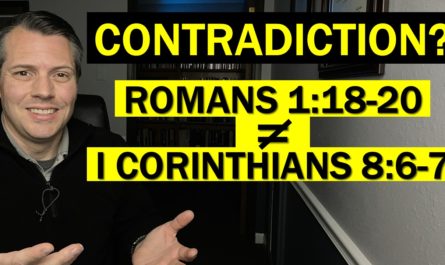No one is righteous. No one seeks after God. Apparently, that means that we cannot be saved before God regenerates us, making us righteous.
Really?
This thought comes partially from one of the most well-known passages in the Bible.
As it is written: “There is none righteous, no, not one; there is none who understands; there is none who seeks after God. they have all turned aside; they have together become unprofitable; there is none who does good, no, not one.” (Romans 3:10-12)
If you grew up in church, you probably heard these verses hundreds of times. I know I did—and I never really questioned what they meant. I could not be saved by being a good kid, because no one can attain perfection.
To me, that was the simple and straightforward meaning. But at some point, I realized that some held to an alternative definition: the inability of a person to respond to Christ unless first regenerated by the Holy Spirit. This, of course, is a Calvinistic interpretation.
So, the question that we have is this: If there is no one righteous, no one who seeks after God, and no one who does good, does God have to regenerate me before I can be saved?
As always, we need to start with context. In chapter two, Paul chastised the Jews who knew the Law but did not obey it, and stressed that just being a Jew is not enough to guarantee salvation.
In light of this bold statement, someone might ask this question:
What advantage then has the Jew, or what is the profit of circumcision? (Romans 3:1)
In other words, what’s the big deal about being a Jew if the Law can’t save us?
Paul’s answer: the Jews are first in line to be God’s servants and receive salvation.
Much in every way! Chiefly because to them were committed the oracles of God. (Romans 3:2)
This privileged position, however, does not make them inherently superior to Gentiles. Paul made this clear:
What then? Are we [Jews] better than they [Gentiles]? Not at all. For we have previously charged both Jews and Greeks that they are all under sin. As it is written: “There is none righteous, no not one; there is none who understands, there is none who seeks after God.” (Romans 3:9-11)
All are under sin—both Jews and Gentiles. It’s not like Jews are righteous simply because they are Jews. They do not get preferential treatment concerning salvation, even though they have the Law. There is none righteous—not even a Jew.
So, that is all that Paul is saying here—that no one, regardless of ethnicity or religion, is righteous.
But, you might say, what about Paul’s statement that no one seeks God? As unregenerate people, we will not seek God, so, apparently, God has to regenerate us before we have any interest in Him. That puts regeneration ahead of faith—a fundamental tenet of Calvinism.
Let me offer two thoughts in response.
1. Non-Calvinists do not claim people seek God on their own.
We agree with Paul that no one seeks God on his own. It is God who does the seeking. Should God refrain from seeking us, we would all be lost.
However, God does seek us—all of us. Jew, Gentile, Calvinist, Arminian, and every other soteriological persuasion. Good thing, too. If He did not seek us and call us with both general and special revelation, we would have no hope.
But He does. And when we are made aware of His call, we can choose if we want to respond or not.
2. Paul is using an Old Testament quote from David.
When New Testament writers quote the Old Testament, they are generally illustrating a truth rather than teaching a detailed doctrine. In this situation, Paul quotes David to impress upon the reader what he is trying to teach: that neither Jew nor Gentile can be saved through human effort.
So, what was David saying? Let’s look at his original writing.
The fool has said in his heart, “There is no God.” They are corrupt, they have done abominable works, there is none who does good. The Lord looks down from heaven upon the children of men, to see if there are any who understand, who seek God. They have all turned aside, they have together become corrupt; there is none who does good, no, not one. (Psalms 14:1-3)
David is describing the widespread foolishness of the human race. Only a fool could observe the universe and deny the existence of God. Yet, it happens all the time. So David expresses the wickedness of man using hyperbolic language: “They have all turned aside…there is none who does good, no, not one.”
Why is this hyperbole? Because some men have done some good things. God even offered an occasional compliment to someone (Abraham, for example—Genesis 18:19). If David actually meant that no person could never do anything good, then God must be a bad judge of character.
David is making the generalized observation that, as a rule, men are wicked. It’s like the girl who just went through another tragic breakup lamenting to her sympathetic friend that “There’s not a decent guy in this world!” She doesn’t know that, and she doesn’t really mean it. She has just had plenty of bad experiences to generalize the dearth of men who deserve her attention.
Paul borrows from David’s hyperbolic dismay at humanity, adding a smattering of other Psalms in verses 12-18, to bolster his point: No one is good enough to deserve salvation—not even Jews.
Then, in verse 19, he returns to his own words to stress the inability of the Law to justify anyone.
Now we know that whatever the law says, it says to those who are under the law, that every mouth may be stopped, and all the world may become guilty before God. Therefore by the deeds of the law no flesh will be justified in His sight, for by the law is the knowledge of sin. (Romans 3:19-20)
The Law can only reveal sin: it cannot make anyone righteous. So, how do we get righteous—both Jew and Gentile, who are all under sin?
But now the righteousness of God apart from the law is revealed, being witnessed by the Law and the Prophets, even the righteousness of God, through faith in Jesus Christ, to all and on all who believe. For there is no difference; for all have sinned and fall short of the glory of God, (Romans 3:21-23)
So how do we get justified? Through faith. And notice the justification happens after the faith. It’s almost as if Paul anticipates Calvinism.
. . . being justified freely by His grace through the redemption that is in Christ Jesus, whom God set forth as a propitiation by His blood, through faith, to demonstrate His righteousness, because in His forbearance God had passed over the sins that were previously committed, to demonstrate at the present time His righteousness, that He might be just and the justifier of the one who has faith in Jesus. (Romans 3:24-26)
Again, God justifies the one who has faith in Jesus. Faith, then justification.
Where is boasting then? It is excluded. By what law? Of works? No, but by the law of faith. (Romans 3:27)
We cannot boast about our salvation because we cannot achieve it through our works. We can only respond in faith to the call of God.
Therefore we conclude that a man is justified by faith apart from the deeds of the law. (Romans 3:28)
We are justified “by faith.” In other words, faith causes the justification.
In Calvinism, you have faith because you are justified.
In the Bible, you are justified because you have faith.
Let’s finish with a quick summary of the Paul’s primary point in Romans 3: he states that there is no difference between how a Jew and Gentile can be saved—both require faith rather than works of the flesh (such as the Law). Both Paul and David use hyperbole to describe the wickedness of man. Left to ourselves, we will not seek God. However, we can respond to God when He seeks us.




So does that mean that the righteous deeds of all non-Jews before Christ and all non-Christians after Christ are fake, despite having the exact same impact of that done by Non-Christians?
If they aren’t fake, and God is still working righteous deeds and attitutes through them despite them being unbelievers, why does he not save them as well?
If Anne Frank tried to be a good person, and believed in and pursued goodness, not by following Jewish law of works, but actual faith in goodness, yet didn’t subscribe to the Christian message about the savior that was the common faith of the Nazis, did Jesus decide to throw into hell to be tortured continuously for all eternity?
Does God oblige outsiders to follow the gospel of those who murder and torture them?
Don’t you think that giving yourself a monopoly on righteousness and on heaven because of Paul pointing out that people can follow religious rules without being good people, is kinda arrogant, unloving, fearmongering, and threatening?